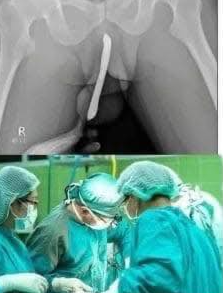Girl Hospitalized After Attempting to Use a Pen in Unsafe Manner — A Cautionary Tale
In a concerning and unfortunate incident, a teenage girl had to be hospitalized after attempting to use a pen in an inappropriate and medically unsafe way. The incident, which shocked hospital staff and raised broader questions about adolescent curiosity and health education, serves as a stark reminder of the importance of awareness, open communication, and proper guidance during the formative years.
According to medical personnel, the girl—whose identity has been withheld to protect her privacy—arrived at the emergency room complaining of internal pain and discomfort. After initial hesitation and embarrassment, it was revealed that she had inserted a ballpoint pen into her body, reportedly as part of an experimental act driven by curiosity and a lack of knowledge about bodily safety.
Doctors performed immediate examinations and determined that the pen had caused minor internal injury and irritation, requiring careful extraction and a short hospital stay for monitoring and treatment. Fortunately, the injuries were not life-threatening, and she is now recovering well under medical supervision. However, the psychological and emotional impact of the experience has been taken seriously, with counselors brought in to provide support.
This incident is not isolated. Health professionals say that adolescents, particularly during puberty, often experience intense curiosity about their bodies. Without proper sex education or safe channels for conversation, they may engage in risky experimentation using household objects that are never meant for internal use.
Medical experts warn that inserting foreign objects into the body can lead to serious complications including infections, internal tears, bleeding, and long-term damage. In some cases, these actions can even become life-threatening if medical attention is delayed or the object becomes stuck or breaks internally.
Pediatricians and educators emphasize the importance of early, age-appropriate sexual and health education that includes honest discussion about anatomy, consent, boundaries, and self-exploration. Creating environments where young people feel safe to ask questions—without shame or punishment—can prevent accidents like this one.
Family counselors also highlight the role of parents and guardians. Encouraging open communication within families, without judgment, can help teens navigate the confusing and sensitive issues that arise during adolescence. When young people feel supported and informed, they are far less likely to seek answers in risky or dangerous ways.
Hospital staff praised the girl for eventually speaking up and seeking help despite her embarrassment. Her decision to come forward likely prevented the situation from becoming more serious.
As she continues to recover physically and emotionally, medical professionals hope her experience will inspire more families, schools, and communities to engage in conversations around adolescent health and safety. The story, while unsettling, offers an opportunity for education and prevention—and a reminder that curiosity should never come at the cost of safety.


